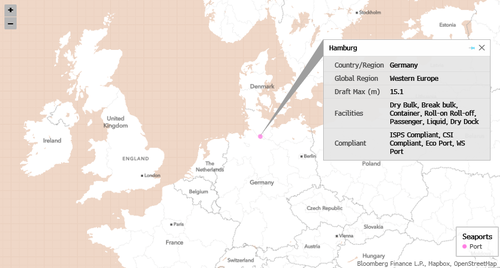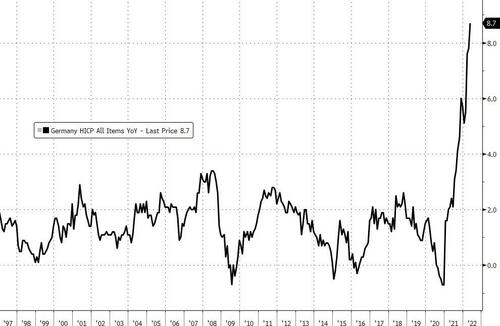
Dozens of container ships are piling up outside Germany's largest seaport by volume, known as the Port of Hamburg. It's the third busiest port in Europe and the 15th largest globally and could be plunged into chaos next week as dockworkers may strike.
German newspaper Die Welt reports congestion at Hamburg is worsening, and container ships have to wait two weeks before entering the port.
"The waiting times are unsatisfactory," a spokesman for shipping company Hapag-Lloyd said, referring to Hamburg.
Hamburger Hafen und Logistik AG (HHLA), a top European port and transport logistics company, said the reason for increasing congestion is a slowdown in the processing of containers, especially imports from the Far East not being transported fast enough by truck and train.
Besides congestion, Kiel Institute for Economic Research estimates that around 2% of the global container load is stuck at the port. There are also mounting concerns dockworkers could be ready to strike.
"There could be additional problems from next Tuesday. Many reckon that dockers could then go on strike in order to increase the pressure on the ongoing wage negotiations. The next round of negotiations is scheduled for June 10, but the peace obligation has already expired," Die Welt said.
According to the Verdi services union, the strike could begin next Tuesday. The last time strikes hit Hamburg was in the late 1970s, a period when the world suffered from disastrous stagflation, similar to the economic climate today.
A shipowner told the German newspaper Hamburger Abendblatt: "If it comes to that, we'll have a super meltdown in Hamburg."
The timing of the proposed strike by dockworkers comes as consumer prices in Europe's largest economy surged 8.7% YoY last month (the highest since the start of the monthly statistics in 1963).
The squeeze for households is far from over as consumers pay record prices for fuel and food and power bills. Inflation is only getting worse for households as the country could be on the verge of a recession.
Dozens of container ships are piling up outside Germany’s largest seaport by volume, known as the Port of Hamburg. It’s the third busiest port in Europe and the 15th largest globally and could be plunged into chaos next week as dockworkers may strike.
German newspaper Die Welt reports congestion at Hamburg is worsening, and container ships have to wait two weeks before entering the port.
“The waiting times are unsatisfactory,” a spokesman for shipping company Hapag-Lloyd said, referring to Hamburg.
Hamburger Hafen und Logistik AG (HHLA), a top European port and transport logistics company, said the reason for increasing congestion is a slowdown in the processing of containers, especially imports from the Far East not being transported fast enough by truck and train.
Besides congestion, Kiel Institute for Economic Research estimates that around 2% of the global container load is stuck at the port. There are also mounting concerns dockworkers could be ready to strike.
“There could be additional problems from next Tuesday. Many reckon that dockers could then go on strike in order to increase the pressure on the ongoing wage negotiations. The next round of negotiations is scheduled for June 10, but the peace obligation has already expired,” Die Welt said.
According to the Verdi services union, the strike could begin next Tuesday. The last time strikes hit Hamburg was in the late 1970s, a period when the world suffered from disastrous stagflation, similar to the economic climate today.
A shipowner told the German newspaper Hamburger Abendblatt: “If it comes to that, we’ll have a super meltdown in Hamburg.”
The timing of the proposed strike by dockworkers comes as consumer prices in Europe’s largest economy surged 8.7% YoY last month (the highest since the start of the monthly statistics in 1963).
The squeeze for households is far from over as consumers pay record prices for fuel and food and power bills. Inflation is only getting worse for households as the country could be on the verge of a recession.







